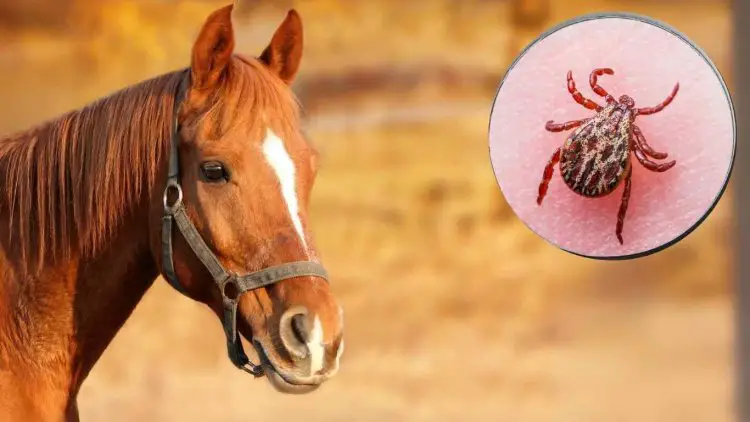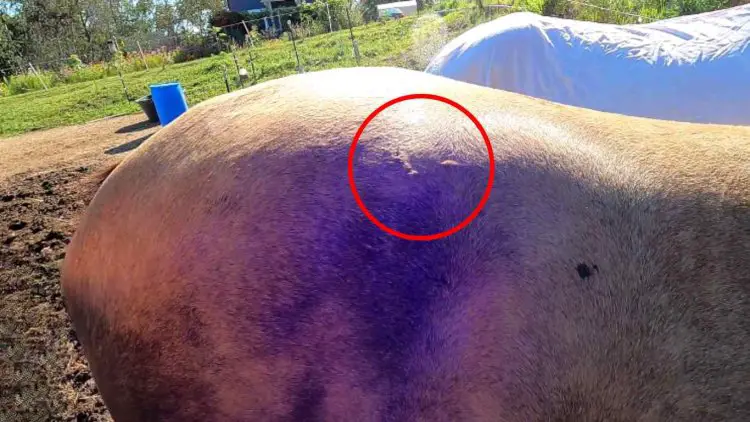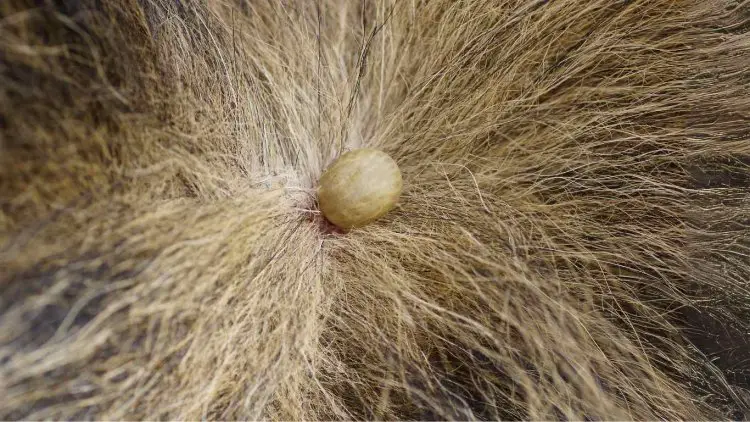Lyme Disease in Horses: Can You Ride a Horse With Lyme Disease?
Discover expert insights on Lyme Disease in Horses – Can You Ride a Horse With Lyme Disease? Learn about causes, symptoms, and treatment for Lyme Disease. Explore the treatment options, emphasizing the crucial role of antibiotics in mitigating Borrelia Burgdorferi infections. Uncover answers to FAQs, including recovery time and the horse's ability to fight Lyme disease. Discover can horses transfer Lyme Disease to humans. Ensure your horse's well-being with comprehensive knowledge on Lyme Disease – a must-read for every horse owner!

Table of Contents
- Introduction
- What is Lyme Disease in Horses?
- What Are the Symptoms of Lyme Disease in Horses?
- How is Lyme Disease in Horses Diagnosed?
- How to Prevent Lyme Disease in Horses?
- Can Horses Transmit Lyme Disease to Humans?
- What Is the Treatment of Equine Lyme Disease?
- Can You Ride a Horse With Lyme Disease?
- FAQs
Introduction
Owning horses comes with immense responsibility, including the necessity to protect them from a plethora of illnesses, one of which is Lyme disease. This article is tailored to educate horse owners about this tick-borne ailment; illuminating its causes, transmission, symptoms, treatment, and prevention measures with the intent of facilitating early identification and effective management of Lyme disease in horses. Remember, a healthy horse is a happy horse!
What is Lyme Disease in Horses?

Contracting Lyme disease has been increasingly common among equine species. This disease is caused by the bacterium Borrelia Burgdorferi, often transmitted by the infamous deer tick. Hence, horses living where these ticks prevail are at a high risk of being affected by Lyme disease. Timely diagnosing Lyme disease is imperative to avoid chronic Lyme syndrome and facilitate recovery with appropriate treatment. Lyme disease in horses manifests in various forms such as lameness, joint stiffness, muscle tenderness, fatigue, behavioral changes, neurologic deficits, and rarely, uveitis. It has also been linked to weight loss, external skin inflammation, and poor performance among the affected horses.
The Tick and Lyme Disease Connection in Equines

The correlation between ticks and Lyme disease in horses is fundamental. A tick bite from an infected tick is the primary conduit for horses to contract Lyme disease. Consequently, understanding this connection can empower horse owners to implement preventive measures and nurture healthier horses.
Borrelia Burgdorferi: The Cause of Lyme Disease
The Borrelia Burgdorferi is at the core of Lyme disease, causing both humans and horses to suffer its ill effects. When a horse is bitten by a tick infected with this bacterium, the contagion transmits into the host, leading to a series of clinical symptoms that portray the onset of Lyme disease in horses.
How Ticks Transmit Lyme Disease to Horses
Upon feeding on the horse's blood, the infected tick transmits Borrelia Burgdorferi into the horse's bloodstream. The bacterium then propagates and imparts the clinical disease, potentially causing lasting harm if not addressed promptly. Understanding the connection between ticks and Lyme disease is critical for horse owners. By implementing preventive measures, they can protect their horses and promote healthier lives.
What Are the Symptoms of Lyme Disease in Horses?
Understanding the signs of Lyme disease in the equines is critical in taking prompt action. The symptoms of Lyme disease are often confused with other ailments due to their generalized nature, making diagnosis a challenge. These symptoms can include:
- Recurrent lameness due to inflammation in the joints- Sensitivity to touch
- Changes in behavior, such as irritability or depressed mood
- Loss of appetite and weight
- Fever
- Depressed performance
- Neurological issues, such as lack of coordination and aimless wandering
Understanding the Clinical Signs of Lyme Disease
Although Lyme disease is caused by bacterial infection, it manifests a complex array of clinical symptoms. These clinical signs may include complications in the neurological and cardiac systems. Lyme disease in horses can indeed have extensive implications if left unchecked. These signs can often be misleading due to their similarity to other conditions, therefore prompt attention from a skilled veterinarian can greatly aid in accurate diagnosis of Lyme disease.
How to Know If Your Horse May Have Lyme Disease
Horses with Lyme disease generally exhibit a range of signs, including fever, lameness, swollen joints, and lethargy. More build symptoms might constitute weight loss, a shift in behavior, and difficulty in movement. Always consult your veterinarian if you suspect your horse has Lyme Disease.
How is Lyme Disease in Horses Diagnosed?
Diagnosing Lyme disease in horses requires professional expertise. A veterinarian plays a crucial role in the diagnosis, employing multiple tests to confirm the presence of Borrelia Burgdorferi and determine antibody levels, which are essential to elucidate the horse's struggle against the disease.
The Role of a Veterinarian in Diagnosing Lyme Disease
A competent veterinarian is pivotal in diagnosing Lyme disease in horses. They would carefully evaluate the horse's clinical symptoms, assess the history of exposure to ticks, and test for Borrelia Burgdorferi infection and Lyme disease through antibody levels. A comprehensive diagnosis is essential for effective treatment.
How to Prevent Lyme Disease in Horses?

Preventing exposure to ticks is the best way to protect horses from Lyme disease. This can be achieved through various measures such as:
- Regularly inspecting horses for ticks, especially during the peak seasons of spring and fall
- Utilizing tick-repellent products specifically designed for horses
- Making environmental changes including maintaining short grasses and limiting access to heavily wooded areas where ticks are likely to populate
- Keep horses inside during peak tick feeding periods at dawn and dusk
- Vaccination (in areas where Lyme disease is common)
Can Horses Transmit Lyme Disease to Humans?
Exploring the Zoonotic Aspect
Despite the close contact between horses and humans, it is important to note that horses cannot directly transmit Lyme Disease to humans. Lyme disease is caused by the bacterium Borrelia burgdorferi, which is most commonly transmitted to humans through the bite of infected black-legged ticks, not by direct contact with infected animals. These ticks are commonly found in grassy and heavily wooded areas, where horses may often graze and roam. This means that horses can potentially carry infected ticks, thereby unintentionally transferring them to humans.
Risks for Horse Owners
For this reason, horse owners should be particularly cautious when being around their horses in tick-infested areas, as they may inadvertently become infected by these ticks. Constant monitoring for the presence of ticks on horses and in their surroundings is necessary. A tick check should be conducted every time after coming into contact with horses. Although Lyme disease cannot be directly contracted from horses, these equine companions could serve as vehicles for infected ticks, thus increasing the potential for horse owners, and those who frequently interact with horses, to contract Lyme disease.
What Is the Treatment of Equine Lyme Disease?

Lyme disease in horses is treated primarily with antibiotics such as Doxycycline, Oxytetracycline, and Minocycline. These antibiotics can help purge the Borrelia Burgdorferi infection, therefore early diagnosis and treatment may drastically improve the horse's prognosis. The antibiotics are usually given orally, though some can be administered through intravenous injection. The duration of treatment usually depends on the severity of the disease but typically lasts for about 4-6 weeks.
The Role of Antibiotics in the Treatment of Borrelia Burgdorferi Infections
The efficacy of antibiotics in curing Lyme disease cannot be stressed enough. Antibiotics are designed to backslide the Borrelia Burgdorferi population in the horse, thus alleviating the clinical symptoms and steering the horse's recovery.
In addition to antibiotics, supportive therapies such as anti-inflammatory drugs and pain relief medication may be used. These help to manage the physical discomfort and inflammation that often accompany Lyme disease in horses. In severe cases where the disease has progressed significantly, other medication may be used to mitigate specific symptoms such as lameness, joint pain, or neurological issues.
Can You Ride a Horse With Lyme Disease?
Horses with Lyme disease may need adequate rest during their recovery. Hence, it's advisable to abstain from riding an infected horse to prevent undue strain. However, each horse's reaction to the disease is different, and the decision about whether to ride should be made in consultation with a qualified veterinarian. Factors such as the severity of the disease, the horse's overall health, and how the horse is responding to treatment will play a big role in this decision. For the health and safety of both the horse and the rider, attempt riding only if your vet gives you the green light.
FAQs
How long does it take for horses to recover from Lyme disease?
The recovery time for horses suffering from Lyme disease can vary greatly depending on the severity of the infection and the overall health of the horse. Typically, it could take anywhere from a few weeks to several months. Some horses may show improvement within the first 30 days of treatment, while others may take longer. It's crucial to note that the timing and effectiveness of treatment significantly influence the recovery period. However, the exact timeline is difficult to predict due to variances in individual horse health conditions.
Can a horse fight Lyme disease on its own?
Horses, like humans and other animals, can contract Lyme disease, typically transmitted through tick bites. Although the animal's immune system will naturally respond to the infection, it might not be sufficient to completely eradicate the Lyme bacteria. Progressive, untreated Lyme disease can lead to serious health issues in horses, including joint stiffness and neurological problems. Therefore, it is essential to seek veterinary assistance for timely diagnosis and treatment to help the horse successfully fight off Lyme disease.
Can Lyme disease cause colic in horses?
Yes, Lyme disease can cause colic in horses. The bacteria that cause Lyme disease, Borrelia burgdorferi, can infect horses and cause a spectrum of symptoms. While this can often manifest in lameness or joint swelling, some horses may exhibit signs of colic. This is because the bacteria can affect the neurological system, disrupting the normal function of the horse's gastrointestinal tract. Therefore, recurrent or unexplained colic could potentially be a sign of Lyme disease in horses.
What's Your Reaction?

















